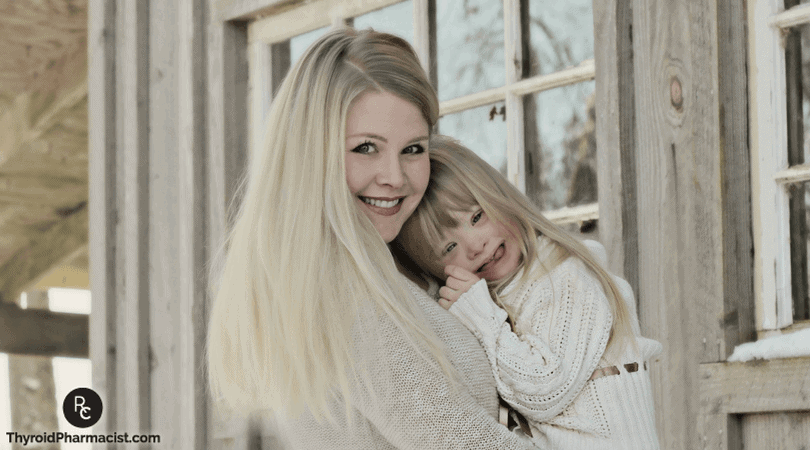This guest post was originally posted in March of 2017, based on personal experience provided by Tiffany Stafford, featured in The Thyroid Secret docuseries. I have since developed new articles and resources for Hashimoto’s that might be helpful for you. For the latest information on Hashimoto’s and Down Syndrome, please visit the following:
One of my favorite interviews during The Thyroid Secret was interviewing little Ellie and her mom, Tiffany. Ellie was born with Down syndrome, a condition that is commonly associated with thyroid disease, yet often missed by doctors.
Not many of my readers know this about me, but before I was diagnosed with Hashimoto’s and decided to become the Thyroid Pharmacist, I spent a few years of my life working with people with special needs and disabilities.
I always wanted to help people and helping people with disabilities seemed like the most natural and rewarding opportunity! I considered careers in special education, social work, and psychiatry before I finally settled on getting my doctorate in pharmacy.
I started working as a “child entertainment” volunteer for a community mental health center before I was old enough to work (I was featured as their youngest volunteer on my local town’s TV show!) and parlayed this experience into a babysitting gig for children with autism.
After I turned 16, I got two jobs: one as a pharmacy technician (I later became the youngest Certified Pharmacy Technician in Illinois) and the second, as an assistant for a recreational program for children with disabilities.
When I wasn’t working at the pharmacy, I spent Tuesday evenings taking the children on outings and taught arts and crafts and swim lessons on Saturday mornings. I was delighted in seeing the joy in the children’s faces at petting zoos and parks and took pride in seeing my “students” progress in their swim lessons and art projects.
In pharmacy school, I had selected a rotation at a developmental center for adults with developmental disabilities as well as a rotation focused on using nutrition to address autism, at the Pfeiffer Treatment Center.
After I graduated from pharmacy school, I got my dream job as a consultant pharmacist for a case management company that served people with developmental disabilities. This is where I had my first taste of patient advocacy, as I was charged with improving health and medication outcomes for a population of thousands of vulnerable individuals. In many cases, my clients were overmedicated and misunderstood, and it was my job to get them the proper care (which often meant reducing or eliminating medications).
I’ll never forget one little boy with autism who was on multiple psychotropic medications above the limit for adults. He was so heavily medicated he could barely walk. Our team advocated to have his medications reduced and eventually, he was back to riding a bike!
Another woman was severely depressed and overweight, and I found that one of her group homes had stopped her thyroid medications!
I found my work with individuals with disabilities very rewarding and incredibly inspiring. Seeing so many of my clients with physical and intellectual disabilities face each day and give each day their best inspired me to be the healthiest person I could be with Hashimoto’s. After all, if my clients with cerebral palsy kept going and smiling despite the pain they were experiencing, I felt like I could keep smiling even with two carpal tunnel braces on each arm!
My clients also taught me about advocating for myself and using my voice. I learned how to research, work the system, and be persistent in order to get their needs met, and these skills helped me recover my own health!
Furthermore, I first heard about the gluten free, dairy free diet (which was extremely helpful in my journey) as a therapeutic diet for people with autism!
Before I was “gifted” with my personal Hashimoto’s diagnosis, I was in the process of outlining a book about appropriate medication management and assessing for medication side effects in people with various disabilities based on a person-centered framework I developed.
Unfortunately, my Hashimoto’s diagnosis, my husband’s layoff, and a cross country move led to me having to put that project off, but I am always thinking about how I can support the community of individuals with disabilities.
A few little-known facts are that children with Down syndrome are at greater risk for having thyroid disorders, and women with thyroid disorders are at greater risk of having children with autism and with Down Syndrome.
This is why I decided to feature the work of Dr. Erica Peirson, who specializes in treating children with Down Syndrome, as well as the stories of her son Miles, her patient Ellie, as well as Ellie’s mom Tiffany Stafford in The Thyroid Secret.
I’d love to share a guest blog post from Tiffany about her family’s journey with Down Syndrome with the hope that it will inspire you!
Here’s Tiffany:
Four years ago our wildest dreams came true with the birth of our last child, a little girl. Her two older brothers were smitten with their new beautiful baby sister. She had downy blonde hair and bright sparkling blue eyes. Five minutes after she was born the doctors pointed out those dreamy sparkles in her eyes. The medical term for them is “brushfield spots.” This, along with the creases in her palms and her slightly upturned eyes are markers for trisomy 21, otherwise known as Down syndrome.
When I say our wildest dreams came true that day, I mean it literally. You see, just a few years prior I was pregnant with our second son. During that time my husband and I both had the same dream. In my dream I saw my daughter, she had her blonde hair in pigtails and cute little glasses. She also had Down syndrome. My husband’s dream was about a little girl who was holding his hand at a football game. She too had Down syndrome. During an ultrasound for our son, we found out that he had two markers for Down syndrome. It wasn’t until after a negative amniocentesis that we confessed our dreams to each other. It was then that we vowed to be done having children, as if not to “risk it.” Little did we know what fate had in store for us.
When Ellie was born, my husband and I knew nothing about Down syndrome. I spent many blurry-eyed sleepless nights researching and learning as much as I could. I was thirsty for information and had a longing for connection with others who understood me. I was desperate for someone to tell me everything would be OK. I googled photos of kids and adults with Down syndrome and was inspecting Ellie to see if she had some of the same features. The future was unclear, what did this diagnosis mean for our family?
As scary as the beginning was, what we did have was an outpouring of love and support for our girl. As I navigated those first few months, I connected with other mothers who had children the same time as me. The feeling of knowing I was not alone on this journey was life changing. Eventually, 7 mothers joined together and the Down Syndrome Diagnosis Network was born. DSDN is a non-profit dedicated to helping parents find connection, support, and information. I am currently the Director of Support, helping new parents join our private online support groups. The support groups are just one small facet of what DSDN does to help families receiving the diagnosis.
What we learned quickly as the months passed was that Ellie was just like any other baby. She needed love, comfort, milk and her diaper changed! She started to smile, then giggled, then talked, and finally, she walked. She just did everything on her own timeline. She had every one of us wrapped around her tiny little finger and captivated everyone she met along the way.
Ellie continued to thrive and grow. Her doctors were very pleased with her growth the first year. Ellie was in the 90th percentile on a typical chart for height. Around age 1, I started noticing some changes in her. Her soft spot was still there and was large, her skin had a yellowish tone and was dry and mottled, she had no teeth, and she was constipated. She was also losing her sparkle. At her 18 month appointment, we found out she had hardly grown! She dropped from the 90th percentile to the 50th, and it happened so fast. I knew something was off, but I wasn’t sure what it was.
I began to ask a lot of questions to the fellow mothers in my support groups. I had blood work done and started to really monitor what I was seeing. All signs were pointing to her thyroid, although many symptoms of thyroid dysfunction mimic Down syndrome. Ellie’s numbers were OK, but not great. She was not treatable according to standard ranges. It was weighing heavily on me that I was seeing so much change in her but yet I didn’t have any answers as to why. Many of her symptoms were brushed off as common Down syndrome traits, but something was telling me to dig deeper.
This was where Dr. Peirson came in. I was hearing more and more about her online and was excited to find out she was local to me. As an added bonus, she has a son with mosaic Down syndrome, so I knew her heart for her patients. She is passionate about her work and truly cares about each of her patients. I talked to my husband, and he agreed that we needed a second opinion. Upon bringing Ellie to her first visit, my suspicions were confirmed. Her thyroid was not functioning properly, so we started her on a natural thyroid medication. The changes were immediate.
Within the first week of Ellie’s treatment, she had three teeth come in. Her tone improved, her complexion improved, constipation went away, and most of all, her old personality was back. Her soft spot closed up, and her yellow-toned skin looked so much healthier. Ellie is a very smart little girl. I truly think that having her health in control has attributed to how wonderful she is doing. She is now 4 years old, in preschool and knows her letters, numbers, colors, and shapes. She also is reading at almost a first-grade level; reading is her strength and she loves it! She is also witty, intuitive, and charming and can command a room upon entering it!
If you are the parent to a child who has additional needs, follow your intuition. Your “mother’s instinct” or that “gut feeling” you get when it comes to your children should not be ignored. You know your child better than anyone else. If something doesn’t seem right, then follow-up on it. Trust yourself! Ask questions, make notes, and don’t be afraid to speak out. The right medical providers are out there and they can help you. Sometimes it may take a second opinion, even a third or fourth, but it’s so worth it to ensure the best care for your child. I have come to realize that my intuition has been—and will be—my guiding light in ensuring the best possible care for our daughter.
I remember how scared I was when I had the dream about my daughter. I didn’t feel equipped to be her mother, but now I realize that I was simply afraid of what I didn’t understand. I had no idea of the beautiful journey I was about to embark on. I’m so grateful that she snuck her way into our lives; she was up there just waiting for the right moment to come down and be ours. I honestly wouldn’t change a single chromosome in her body because if I did, she wouldn’t be Ellie. But I do want her to be the best version of herself that she can be. This is why I am so grateful for providers like Dr. Peirson and I can’t imagine where we would be today without her.
I’m so grateful that Tiffany and Ellie shared their stories with me. I had the best time hanging out with Tiffany, Ellie and Grandma during our time recording for the documentary. Ellie doesn’t just shine- she sparkles and touches every person around her with her heart!





 Disclosure: As an Amazon Associate I earn from qualifying purchases. We are a professional review site that receives compensation from the companies whose products we review. We test each product thoroughly and give high marks to only the very best. We are independently owned and the opinions expressed here are our own.
Disclosure: As an Amazon Associate I earn from qualifying purchases. We are a professional review site that receives compensation from the companies whose products we review. We test each product thoroughly and give high marks to only the very best. We are independently owned and the opinions expressed here are our own.
Thank you for sharing this story. My son has DS and had many other medical problems. When he was finally diagnosed with Hypothyroid, we were unaware that his blood work had been abnormal for quite some time before the doctor prescribed medication. It was only when he started sleeping all of the time that they mentioned that he had shown up as Hypothyroid and was prescribed Synthroid. He is 22 now and has been on Synthroid for over 10 years. I am so thankful for Dr. Izabella for all of the information she has shared. Looking forward for to feeling better soon.
Linda – thank you for following this page and for sharing. <3 I’m looking forward to hearing about his progress on this page.
Did you know that if you live in the United States, the UK, Australia, Europe and most developed countries that add iodine to the salt supply and take thyroid medications, there’s a higher probability that you do have Hashimoto’s?
Depending on the source, estimates are that between 90-95% of those with hypothyroidism have Hashimoto’s.
But most doctors will never tell people that they have Hashimoto’s, or that their own immune system is attacking their thyroid. People are told that their “thyroid is sluggish”, and that these things happen with age and “Just take this pill, you’ll be fine.” I hope you check out these articles that I wrote.
ARE YOU DOING EVERYTHING FOR YOUR THYROID BUT NOT YET WELL?
https://bruno-michael-wentz.dev01.rmkr.net/articles/are-you-doing-everything-for-your-thyroid-but-not-yet-well/
DO YOU HAVE HYPOTHYROIDISM OR HASHIMOTO’S OR BOTH?
https://bruno-michael-wentz.dev01.rmkr.net/articles/do-you-have-hypothyroidism-or-hashimotos-or-both/
Here are the tests you need for diagnosis. Most endocrinologists don’t run them all so you will have to request them. Make sure to request a copy of your labs as well.
TOP 6 THYROID TESTS FOR DIAGNOSIS
https://bruno-michael-wentz.dev01.rmkr.net/articles/top-6-thyroid-tests/
Izabella
What a beautiful story about Tiffany and Ellie! It’s hopeful as well as educational!
I so enjoyed the Thyroid Secret and love that you are donating some of the proceeds to the Down Syndrome Diagnosis Network.
I too spent some of my youth volunteering at various centers for those with both physical and mental disabilities and it was so incredibly rewarding! It was lovely to learn this about you!
Thanks for all that you do!
Trudy – thank you for your kind words and support, they warm my heart. <3
A friend of mine just found out that she may be pregnant with a DS baby. She already has a daughter with special needs, so this is a daunting prospect. If this is confirmed, is there anything she can do now to help improve the health outcomes for her baby?
It’s lately been a roller coaster with my DS daughter. She cannot handle her monthly cycle properly. I’m fearful to do any birth control because she can’t tell me how she’s feeling and. She just started synthroid 3 days ago . She’s been up and down all night with taking off her pads and underwear and I’m deAd tired. She obviously doesn’t tactfully like the feeling. I Even got the panties with pads built in. She’s 19 and is now with an adult dr. She interrupts and screams out of nowhere sometimes till she’s hoarse. Dr. Suggested abilify I said no. Trying adderall but not sure it’s helping. Cbd oil too. Not much better. Genetics dr next. Life has gotten a bit crazy. Blood work done while she’s under anesthesia for teeth cleanings. any ideas ?
Paula – thank you so much for reaching out and sharing your daughters journey. My heart goes out to you both. <3 I highly recommend that you work with a functional medicine clinician to be a part of your health care team. It’s an entire medical specialty dedicated to finding and treating underlying root causes and prevent serious chronic disease rather than treating individual disease symptoms. I believe that everyone needs to find a practitioner that will let them be a part of the healthcare team. You want someone that can guide you, that will also listen to you and your concerns. You want someone that’s open to thinking outside of the box and who understands that you may not fit in with the standard of care. It's a good idea to ask some standard questions when contacting a new doctor for the first time. Something else to consider is you can work with a functional doctor remotely, via Skype. You could also contact your local pharmacist or compounding pharmacy, who may be able to point you to a local doctor who has a natural functional approach. But I encourage you to keep looking for the right one for her. Here are some resources you might find helpful.
CLINICIAN DATABASE
https://www.thyroidpharmacistconsulting.com/pages/clinician-database
FIND A FUNCTIONAL MEDICINE CLINICIAN
https://ifm.org/find-a-practitioner/
http://www.thyroidpharmacistconsulting.com/recommended-compounding-pharmacies.html
You may also find this article helpful as well: https://bruno-michael-wentz.dev01.rmkr.net/articles/thyroid-down-syndrome-connection/